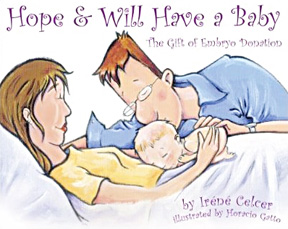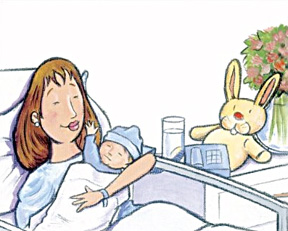Archive for November, 2011
Hope & Will Have a Baby – Book review by Craig R. Sweet, M.D.
 This book is one of a collection of third party conception children’s books written by the same author and illustrator and published by Graphite Press, copyright of 2006. It is one of the only books I have seen for children conceived though embryo donation.
This book is one of a collection of third party conception children’s books written by the same author and illustrator and published by Graphite Press, copyright of 2006. It is one of the only books I have seen for children conceived though embryo donation.
Ms. Celcer is a mental health professional that feels it is important to be up front in telling the children of embryo donation about their origin. In her forward, she cites the past secrets in adoption causing harm. She goes on suggesting that-
- • Children somehow sense the secrets
- • The failure to divulge may create shame in the parents of donated embryo offspring
- • Failure to tell a child results in a loss of pride of their beginnings
This book is to be used to tell the children about their loving conception while trying to manage the complex emotions of the parents.
Through the eyes of Hope and Will, a young married couple in love, the book explains what a “special place” the uterus is and how  embryos are created. Hope and Will experience infertility, depression and probably some grumpiness (can you imagine?). They seek help through Dr. Quest, who gives Hope tablets, pills and shots, but to no avail. Embryo donation is discussed, explaining anonymous and open options in simple and easy to understand terms.
embryos are created. Hope and Will experience infertility, depression and probably some grumpiness (can you imagine?). They seek help through Dr. Quest, who gives Hope tablets, pills and shots, but to no avail. Embryo donation is discussed, explaining anonymous and open options in simple and easy to understand terms.
Hope and Will conceive though embryo donation. The author emphasizes love, pride and excitement when the delivery finally takes place. Hope and Will are clearly grateful to their donor couple whom they have never met. Enough information is provided about the donors to help the child understand his origin.
While perhaps a little complex for a young child of four or five, the book might work quite well for a slightly older child. The pictures are wonderful and the emphasis on love and the desire to have a child by whatever means necessary is well done. I have always suggested that if parents tell the child, they should highlight their tremendous desire to have and love that child, as well as how hard they worked to bring such a wonderful child into their home.
Disclosure in embryo donation is a periodic theme of a number of my blogs. Adoption is clearly different than embryo donation. Adoption tends to be well accepted by most of the world’s religions. If embryo recipients tell friends, family and their donor-conceived offspring, there may be significant repercussions. Will the recipients and offspring be criticized, ostracized or, even, excommunicated by these same people or by their own religion?
Unfortunately at this time, I simply don’t believe we have enough data to make a clear recommendation to embryo recipients although there is wonderful ongoing research that will hopefully help to answer this question. For now, extrapolating what we have learned from adoption may simply not be appropriate for embryo donation, although passions on both sides of this issue  abound. The long-term consequences of secrecy vs. total openness to friends, family and the child of embryo donation are essentially unknown and I feel this decision needs to be made carefully with consultation with skilled mental health professionals (and Ms. Celcer is one of them), reproductive endocrinologists and perhaps, most importantly, recipients that have already traveled this journey.
abound. The long-term consequences of secrecy vs. total openness to friends, family and the child of embryo donation are essentially unknown and I feel this decision needs to be made carefully with consultation with skilled mental health professionals (and Ms. Celcer is one of them), reproductive endocrinologists and perhaps, most importantly, recipients that have already traveled this journey.
Selling for about $20 at Barnes & Noble, the purchaser should know this is a paperback and only 28 pages. The reader is clearly paying for the content and not story length or volume.
I highly recommend this book for those parents who decide to tell their child they were conceived through embryo donation, although the story line may need to be changed for single women and gay and lesbian couples. For the lucky parent(s) of embryo donation, this is a fairly good place to start if disclosure is the path they choose to follow.
Craig R. Sweet, M.D.
Founder, Medical & Practice Director
Embryo Donation International
Disclosure Issues in Embryo Donation: Summary Comments
Brief Introduction
Embryo donors and recipients are faced with a number of life-changing decisions as they contemplate disclosure. This is the final segment of a five-part series summarizing the complex decisions surrounding the disclosure of the genetic origins of embryo donor-conceived individuals to family, friends and the offspring themselves.
What are some of the questions that embryo donors and recipients must explore before deciding to disclose or not?
Embryo donors must decide if they want a relationship with the donor-conceived individual being raised by another family. Are the donors willing to disclose their donation of embryos, which may have taken place years ago, to friends and family, including their existing children? At what age would they want the donor-conceived individual to contact them?
Recipients need to ask related questions about whether they should tell their embryo donor-conceived children about their origins. If they want to do so, when should they tell and what information should they share? Are the recipients comfortable letting their family members and friends know of their infertility history? Will the recipients and offspring be criticized, ostracized or, even, excommunicated by these same people or by their religion? Are they comfortable with their child contacting and potentially having a relationship with the embryo donors and their blood siblings?
Can an understanding of adoption disclosure be used in the world of embryo donation?
It is understandable, but potentially misguided, that some professionals believe embryo donation is identical to the adoption of a live child. I have written about this topic before. While the American Society for Reproductive Medicine (ASRM) states that the term “embryo adoption” should not be used, some facilities do so openly.
However, regardless of the legal differences, there also are a number of very practical differences:
- Because the embryo recipient carries and delivers the child, her pregnancy may look natural, making disclosure by the recipients optional. Adoption is much more difficult to hide.
- Disclosure of the embryo donation process may not be well accepted by friends, family and some religions. While not universally accepted, adoption may be better tolerated.
- As with sperm donation, single women and lesbian couples who conceive with donated embryos are more likely to disclose because the fatherhood issue inevitably arises. Heterosexual couples, however, are the least likely to disclose.
How often is disclosure currently revealed?
 There is a growing body of data that suggests only a minority of the embryo donor-conceived children are told of their origins. In an English study of 17 embryo donation families with donor offspring between five and nine years old, only 18% of the recipient parents had told their children (MacCallum F. et al. 2008). An additional 24% planned on telling, 12% were undecided and 47% stated they would not tell. The reality is that many of those who planned on telling or were undecided may eventually decide against disclosure as the child ages and enters the more difficult years of adolescence. This seemed to be different than other donor procedures where 46% of donor sperm insemination parents and 56% of egg donation parents planned to disclose (Golombok S, et al. 2004).
There is a growing body of data that suggests only a minority of the embryo donor-conceived children are told of their origins. In an English study of 17 embryo donation families with donor offspring between five and nine years old, only 18% of the recipient parents had told their children (MacCallum F. et al. 2008). An additional 24% planned on telling, 12% were undecided and 47% stated they would not tell. The reality is that many of those who planned on telling or were undecided may eventually decide against disclosure as the child ages and enters the more difficult years of adolescence. This seemed to be different than other donor procedures where 46% of donor sperm insemination parents and 56% of egg donation parents planned to disclose (Golombok S, et al. 2004).
Why has anonymity been the norm in embryo donation?
The concept of anonymity in egg/sperm/embryo donation has its roots in the physician/patient relationship to meet a series of needs (Daniels K. 1997). To assume that it should be discontinued for everyone doesn’t take into account the ethical, social and religious circumstances of different patients.
Since the medical profession assumes parents are able to make, without question, thousands of different choices for their children, assuming they are incapable of making a decision, such as disclosure which affects both the child and parents, is simplistic and rather paternalistic.
Why not disclose?
Let’s face it; there might indeed be a lack of societal approval of offspring who originated from donor material. Many people are judgmental regarding embryo donation, especially in cultures and religions that emphasize genetic inheritance. Recipients have legitimate reasons to fear the potential damage to themselves and their children from other people’s negative reactions, social stigma and resulting isolation (Shehab D, et al. 2008).
Some of the reasons recipients do not want to disclose include protecting their children  and family relationships from rejection, not feeling a need to disclose or uncertainty about how to approach the matter (MacCallum F, et al. 2007, Jadva V, et al. 2009 & Mahlstedt PP, et al. 2010). Disclosing also will broadcast their infertility issues, which they may have kept quite private in the past (Klock SC. 1997). Another common reason given for not disclosing is fear that they as non-genetic parents will be rejected. Actually, there is no data to support or deny this last very human concern.
and family relationships from rejection, not feeling a need to disclose or uncertainty about how to approach the matter (MacCallum F, et al. 2007, Jadva V, et al. 2009 & Mahlstedt PP, et al. 2010). Disclosing also will broadcast their infertility issues, which they may have kept quite private in the past (Klock SC. 1997). Another common reason given for not disclosing is fear that they as non-genetic parents will be rejected. Actually, there is no data to support or deny this last very human concern.
Unlike adoption, it is doubtful that the offspring of embryo donation will have to resolve the “history of rejection” unlike adopted children who were separated from their birth parents (Widdows H, et al. 2002). Families created through embryo donation are a product of a loving gift and not formed from perceived rejection. Therefore, some of the motivation to disclose in adoption simply does not exist in embryo donation.
Why should parents disclose?
The most common reason for embryo recipients to disclose is a fear that the child will accidently discover the facts at a later date (MacCallum F, et al. 2007). One study of adult offspring of sperm donation found that about 1/3rd of the individuals learned of their donor origins after an argument, from another person or they just figured it out themselves (Mahlstedt PP, et al. 2010). In a recent study, about 10% (47/458) of the sperm donor offspring who were searching for their donors and half-siblings found out by accident (Beeson DR, et al. 2011). They were apparently told by siblings, family or friends; discovered paperwork or inheritable medical issues that their recipient parents did not have; inadvertently overheard their parents talk about it; or it was revealed as a consequence of divorce. Recipients who tell family and friends but not the child are asking for future problems. When examining these two studies, it is clear there is a reasonable risk that the offspring will discover their origins, even under the best of circumstances. It also is important to realize that sperm, egg and embryo donation procedures are different when analyzing the study results.
There are some embryo donation recipients who feel it is simply best to not have secrets in the home. Others believe the embryo donor-conceived children have a moral right to know their origins. Some feel it is important that the children understand and connect to their genetic inheritance beyond the family who raised them.
What should be disclosed?
There are three decision levels in disclosure: 1) To decide to disclose, 2) To decide what age to disclose, and 3) To decide what information is to be provided. One can simply tell the child he or she was embryo donor-conceived but the child is certain to have more questions. At the very least, I believe providing the donors’ photographs (when they are available) as well as their medical, surgical, psychiatric, family and social histories are needed. However, providing actual identifying information needs to be handled carefully and thoughtfully.
When should disclosure take place?
Disclosure early in the child’s development, certainly before age ten, would seem to be ideal. Some mental health professionals (MHP’s) feel it should be discussed as early as possible. If disclosure occurs in adolescence or later, young adults may feel mistrust, alienation, identity confusion, frustration and even hostility towards their family (Ethics Committee, 2004 & Mahlstedt PP, et al. 2010). About 46% of donor sperm offspring who were told at the age of 18 or older stated they were confused. It is probably best to tell the child before the age of 10 than wait until later where there is a doubling of the number of children who were unsettled with the information.
Why do embryo donor-conceived individuals want to know their genetic origins?
Many embryo donor-conceived individuals may be curious about their donors’ physical characteristics and original motivation to donate, as well as possess a desire to know their genetic identity and, perhaps, provide an ancestral history for their own children. (Ravitsky V, et al. 2010 & Mahlstedt PP, et. al. 2010).
For many, the search for their donors may go well beyond just seeking simple information. In two recent studies of offspring searching for their donor sperm fathers, 80-88% were intensely curious about their donor and wanted to contact him. Up to one-third desired an actual relationship with the sperm donor (Beeson DR. 2011 & Mahlstedt PP, et al. 2010). It should be understood, however, that studies such as these might not represent a balanced patient sample. Only offspring searching for information contributed to those studies. There wasn’t a practical way to capture the opinions of those offspring who were not part of the Internet support groups, who may indeed represent a very silent majority.
Do embryo donor-conceived offspring have the right to know their origins?
Many donor-conceived individuals feel they have a right to know their genetic origins (Shehab D, et al. 2008). Embryo donors and recipients, who may prefer an anonymous process, have rights that compete with those of the donor-conceived individuals. Embryo donors and recipients have legal rights that are in direct contrast to the offspring’s moral view that family secrets shouldn’t be kept. There is no easy way to reconcile these contrasting legal rights and moral perspectives. Most agree, at the risk of offending those who feel differently, that in a society ruled by law, a legal right ultimately trumps a perceived moral right. Thus, the legal rights of donors and recipients continue to prevail in this country.
Should disclosure be mandated?
There is a stronger preference to discard or abandon the embryos than there is to donate them. Placing any impediments on embryo donation, such as mandating disclosure, may not only reduce the number of embryos donated but will almost certainly result in a greater number of embryos discarded or abandoned. I cannot imagine the well-meaning individuals who are asking for mandated disclosure would want the loss of embryos and potential families to be an almost certain unintended consequence.
Parents who used donor material feel the decision to disclose is private, highly personal and should be left to the discretion of the individual families and not regulated in any way (Shehab D, et al. 2008). A dual-track of disclosure/nondisclosure system will most meet the needs of everyone (De Jonge C, et al. 2006). We need to educate, guide and support, but not force these processes.
What happens to children who learn or don’t learn about their origins?
Interestingly, children do not seem to be harmed if disclosure does not take place.
Warm parent-child relationships and positive child development have been documented, although few of these donor embryo-conceived children have yet entered adolescence (Golombok S, et al. 2006). While more data and follow up studies are certainly needed, embryo donation children do not seem to be at increased risk for developing psychological problems during early and middle childhood, regardless of disclosure decisions. Supporting these findings about early disclosure, neither the children nor the family seem to be harmed (MacCallum F, et al. 2007 & 2008). While not definitive, the research we have so far suggests that disclosure decisions, either for or against, will not cause irreparable harm to the embryo donor-conceived individuals or the parents who raised them.
Interestingly, research shows that embryo donation families are more child-centered than adoptive and, even, other IVF families, regardless of their disclosure status (MacCallum F, et al. 2007 & 2008). This may be due in part to the recipients’ older age and maturity compared to younger IVF and adoptive parents. Embryo donation-conceived children are tremendously appreciated, greatly desired and hard fought for by their parents. This should give embryo donors confidence that donor-conceived offspring will be well cared for by wonderful recipient families.
What should be considered if embryo donor-conceived individuals meet the donors?
If donor-conceived individuals connect their donors and/or blood siblings, it is important that everyone’s expectations be reasonable. Members of donor-linked families may have a significant mismatch regarding their levels of hope and expectation about contact (Scheib JE, et al. 2008). Some of the participants may have a tendency to romanticize the first meeting and future relationship. The participants should move slowly and carefully, without inappropriate expectations.
It is exceedingly important that the relationship between the parents who raised the child and the embryo donor-conceived offspring not be harmed, as this is the basis for the child’s stability and home life. The fear that this relationship will be damaged is one of the main reasons recipients prefer to not disclose, so it must be protected.
Long-term data regarding the relationships between embryo donors and embryo donor-conceived individuals is not yet available, so we simply are unable to tell any of the participants what the outcome may be (Grotevant HD, et al, 2008). The parents who raised the donor-conceived child may feel threatened by the relationship between the donors and offspring. It would be irresponsible for us as clinicians to assume that all will go well. We must remain cautious and counsel our patients carefully and individually until we have more information to guide them.
Can recipients get help in deciding if disclosure should take place?
Consultation with a mental health professional (MHP) regarding disclosure is strongly encouraged but the counselor must understand the subtle differences between embryo donation and adoption, where disclosure is the norm. Neutrality is required and finding a skilled and experienced MHP is important. Many patients resent direct suggestions about disclosing and far prefer a discussion that examines their own needs and perspectives (Klock SC, 1997). In reality, it is really not appropriate to give a uniform recommendation that does not take into account the personal, ethical and religious views of the embryo recipients.
Even more important, embryo recipients may want to hear from other recipients, people who have worked through the issues or are struggling with making the decision (Klock SC, 1997).
In our three recent surveys examining the perspectives of potential embryo donors, recipients and offspring, there were a few consistent findings:
- From the embryo donor perspective, the majority polled desired an open process.
- From the embryo recipient perspective, the majority polled desired anonymity.
- The majority of potential embryo donors and embryo recipients would disclose to their friends and family.
- If open-identity was available, the majority felt information should be shared and potential contact be made before the age of 18, which may differ in adoption proceedings.
Are reproductive facilities prepared for disclosure?
A medical providers’ first reaction will be to protect their patients: the embryo donors and recipients. State and federal statutes protect confidentiality and clear consent must always be provided before medical/identifying information is released to a third party. The reproductive facilities also will want to be insulated from any legal consequences should disclosure occur.
Some medical practices will be operationally challenged to have records available years after procedures are performed. Many states require that medical records be retained for seven years. The Federal Drug Administration (FDA) requires practices to retain for ten years the medical records of patients involved in third party conception, while the ASRM suggests the records be stored indefinitely. Being able to identify those particular charts from others that would otherwise routinely be discarded is a logistical challenge. In my practice, we color-code the charts involving any type of donor material, making them easy to pull and save.
I also feel embryo recipients have a responsibility to keep the information they were originally provided about their embryo donors protected and safe in case the practice’s medical records are ever lost or deleted.
Regardless, the facilities have a responsibility to assure charts are available and that systems are in place to make disclosure possible. Policies and procedures will need to be created so that they are ready when the requests come. Mirroring the adoption world in this instance may be of use.
How do recipients disclose?
Experienced MHP’s can provide invaluable assistance in helping embryo recipients present this  sensitive information. Reproductive endocrinologists, well versed in this topic, may also be very useful in deciding how and when to tell the children. Forums where parents can discuss these issues with other parents who have lived them also may be indispensible. While few books exist on the topic, I will be reviewing one quite soon that does. Please stay tuned.
sensitive information. Reproductive endocrinologists, well versed in this topic, may also be very useful in deciding how and when to tell the children. Forums where parents can discuss these issues with other parents who have lived them also may be indispensible. While few books exist on the topic, I will be reviewing one quite soon that does. Please stay tuned.
Using the following phrases and ideas in the discussion may be useful:
- We wanted you to be in our lives so much, we had to travel far and wide to find you.
- The people who gave us their embryos, which included you, gave us the most wonderful gift in the world. They loved you so much that they wanted you to enjoy life with us.
- I got to carry and protect you, giving you all the love I could.
- Remember that eggs, sperm and embryos don’t make a family any more than bricks make a happy home. What makes a family is how we support and love each other.
A good way to start this conversation is by emphasizing love, your commitment to find them, the amount of time, effort and emotion you invested in bringing them into the world, and the fact that genetics doesn’t necessarily make a family. I’m sure MHP’s will offer recipients some great phrases and ideas, which I will encourage that they share with us on this blog.
What are the long-term consequences of disclosure?
Research is needed to find out more about long-term disclosure outcomes. It is difficult to ascertain how children are fairing who are not told about their origins fare because these individuals are not readily accessible to research. Also, what happens over time with open donation is largely unknown. I feel it is unrealistic to assume that everyone will live together as one big happy family. I suspect, however, that the donor-conceived children will benefit in establishing connections with blood siblings.
If disclosure occurs and the offspring are destined to contact their genetic parents, their reunion should not be romanticized. They will not necessarily be welcomed with open arms up to two decades later by the donors. In fact, we don’t have any idea how well or how disruptive these reunions will be. Once again, research is desperately needed.
Is there a disclosure compromise available?
The idea of open-identity is a fascinating concept for embryo donation. This would allow donors to be contacted if the recipients eventually disclose the genetic origins to their donor-conceived offspring. According to our recent surveys, most respondents wanted disclosure with open-identity to occur before the children turn 18 and have the ability to contact the donors. But what harm will come to the child if disclosure and contact are done earlier in the formative years? Would there be some advantages to knowing earlier rather than later in adulthood?
It would seem that if recipients are disclosing for the sake of the child, it may truly be best to allow disclosure and open-identity earlier rather than later. I hope to pose this question to MHPs in the months to come.
In summary
I feel it is far better that we design programs with open-identity options but not legislate them. Legislation, especially if it is retroactive, will inject uncertainty about every current rule governing the practice of egg/sperm/embryo donation (Guido P, 2001). Legislation will do more to shut donation processes down than any other development. I understand there are some donor-conceived individuals who feel that all information should be open to review, but past contracts were doubtfully formulated that way. Although unpopular with some, the perceived rights of the donor offspring should not be allowed to circumvent the true legal rights of the donors and recipients.
At a recent ASRM meeting, some MHPs and reproductive attorneys lamented that anonymous embryo donations are allowed to continue. I explained that if they want to change physicians’ and patients’ perspectives on anonymity, they would only succeed with data showing the long-term benefits of disclosure. Until that time, clinicians and patients alike will be hesitant to adopt a stance that is not yet supported by unbiased research. We should tread lightly and make very few assumptions when it comes to issues so important as disclosure or we risk doing harm to our patients. We all need a bit more information in caring for our embryo donors and recipients. We must never forget, however, that embryo donation-conceived individuals, who were never our actual patients, and are still owed thoughtful care and tremendous compassion. We must keep an open mind and learn from their perspective.
There will always be a group of patients who will want anonymity and we all need to respect their wishes. Everyone involved in this debate needs to take a breath and step back. I grow weary of a very vocal group of patients who believe their way is the single right way. This is not a black and white issue. We should instead see the disclosure controversy in shades of grey. Compromise these days seems to be viewed as form of weakness in our country’s politics. This country was founded on the basis of choice and I feel strongly that we should design systems that will allow for choice while educating the participants of embryo donation about their options and the potential results of both disclosure and non-disclosure to embryo donor-conceived individuals. It is our responsibility.
As always I welcome a respectful dialogue, especially from those who disagree. I look forward to reviewing research studies that will guide all of us so we may better counsel embryo donors, embryo donor recipients and especially the embryo donor-conceived individuals, who remain the final focus of this entire discussion.
Craig R. Sweet, M.D.
Reproductive Endocrinologist
Founder, Medical & Practice Director
Embryo Donation International
Info@EmbryoDonation.com
www.EmbryoDonation.com
Associated Blog Segments:
- Introduction: Disclosure Issues in Embryo Donation
- Embryo Donor Perspective
- Survey Results: Imagine you are an Embryo Donor
- Blog: Disclosure Issues From the Perspective of the Embryo Donor (Part 1 & Part 2)
- Embryo Recipient Perspective
- Survey Results: Imagine you are an Embryo Recipient
- Blog: Disclosure Issues From the Perspective of the Embryo Recipient (Part 1 & Part 2)
- Embryo Donor Offspring Perspective
- Survey Results: Imagine you are an Embryo Donor Offspring
- Blog: Disclosure Issues From the Perspective of the Embryo Donor Offspring (Part 1 & Part 2)
Registry Links:
- The Donor Sibling Registry: https://www.donorsiblingregistry.com/
- UK Donor Link: http://ukdonorlink.org.uk/ (funding uncertain)
- Western Australia’s Voluntary Register for Donors, Offspring and their Families: http://www.voluntaryregister.health.wa.gov.au/home/
- BCdonorconception, British Columbia donor offspring: http://groups.yahoo.com/group/BCdonorconception/
Donor Sperm Facility Registries:
- California Cryobank’s Sibling Registry: http://www.sibling-registry.com/
- Fairfax Cryobank: Donor Sibling Groups: http://www.donorsiblinggroups.com/Home_Page.html
General Third Party Conception Support:
- Donor Conception Support Group: http://www.dcsg.org.au/
- PCVAI, People Conceived via Donor Insemination: http://groups.yahoo.com/group/PCVAI/
- International Donor Offspring Alliance: http://www.idoalliance.org/
- The Donor Conception Support Group of Australia Inc: http://www.clan.org.au/dcsg/index.html
- Canadian Donor Offspring: http://www.canadiandonoroffspring.ca/
- Germany: http://www.spenderkinder.de/
References:
Beeson DR, Jennings PK, Kramer W. Offspring searching for their sperm donors: how family type shapes the process. Hum Reprod. 2011 Sep;26(9):2415-24.
Daniels K. The controversy regarding privacy versus disclosure among patients using donor gametes in assisted reproductive technology. J Assist Reprod Genet. 1997 Aug;14(7)-373-5.
De Jonge C, Barratt CL. Gamete donation- a question of anonymity. Fertil Steril. 2006 Feb;85(2)-500-1.
Klock SC. The controversy surrounding privacy or disclosure among donor gamete recipients. J Assist Reprod Genet. 1997 Aug;14(7)-378-80.
Ethics Committee of the American Society for Reproductive Medicine. Informing offspring of their conception by gamete donation. Fertil Steril. 2004 Sep;82 Suppl 1-S212-6.
Ethics Committee of the ASRM. Informing Offspring of their conception by gamete donation. Fertil Steril 2004;81(3):527-31.
Golombok S, Lycett E, MacCallum F, Jadva V, Murray C, Rust J, Abdalla H, Jenkins J, Margara R. Parenting infants conceived by gamete donation. J Fam Psychol. 2004 Sep;18(3):443-52
Golombok S, Murray C, Jadva V, Lycett E, MacCallum F, Rust J. Non-genetic and non-gestational parenthood: consequences for parent-child relationships and the psychological well-being of mothers, fathers and children at age 3. Hum Reprod. 2006 Jul;21(7):1918-24.
Grotevant HD, Wrobel GM, Von Korff L, Skinner B, Newell J, Friese S, McRoy RG. Many Faces of Openness in Adoption: Perspectives of Adopted Adolescents and Their Parents. Adopt Q. 2008 Jul 1;10(3 & 4):79-101.
Guido P. The reduction of sperm donor candidates due to the abolition of the anonymity rule: Analysis of an argument. J Assist Reprod Genet. 2001 Nov;18(11)-617-22.
Jadva V, Freeman T, Kramer W, Golombok S. The experiences of adolescents and adults conceived by sperm donation: comparisons by age of disclosure and family type. Hum Reprod. 2009 Aug;24(8):1909-19.
Klock SC. The controversy surrounding privacy or disclosure among donor gamete recipients. J Assist Reprod Genet. 1997 Aug;14(7)-378-80.pdf
MacCallum F, Golombok S, Brinsden P. Parenting and child development in families with a child conceived through embryo donation. J Fam Psychol. 2007 Jun;21(2):278-87.
MacCallum F, Keeley S. Embryo donation families: a follow-up in middle childhood. J Fam Psychol. 2008 Dec;22(6):799-808.
Mahlstedt PP, LaBounty K, Kennedy WT. The views of adult offspring of sperm donation: essential feedback for the development of ethical guidelines within the practice of assisted reproductive technology in the United States. Fertil Steril. 2010 May 1;93(7):2236-46.
Ravitsky, V. & Scheib, J.E. (2010). Donor-conceived individuals’ right to know. Hastings Center Bioethics Forum 2010;40:(4).
Scheib JE, Ruby A. Contact among families who share the same sperm donor. Fertil Steril. 2008 Jul;90(1):33-43.
Shehab D, Duff J, Pasch LA, Mac Dougall K, Scheib JE, Nachtigall RD. How parents whose children have been conceived with donor gametes make their disclosure decision: contexts, influences, and couple dynamics. Fertil Steril. 2008 Jan;89(1):179-87.
Widdows H, MacCallum F. Disparities in parenting criteria: an exploration of the issues, focusing on adoption and embryo donation. J Med Ethics 2002;28:139-42.
